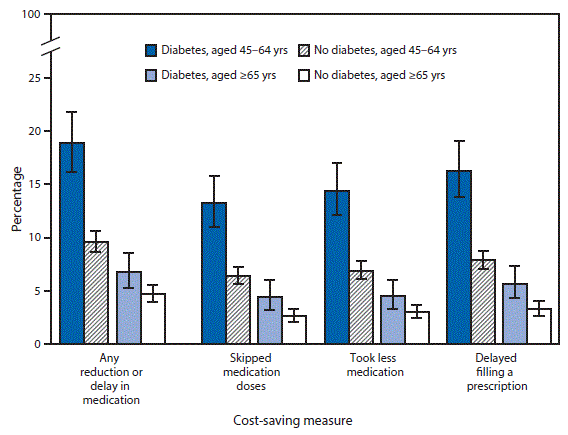QuickStats: Percentage* of Adults Aged ≥45 Years Who Reduced or Delayed Medication to Save Money† in the Past 12 Months Among Those Who Were Prescribed Medication, by Diagnosed Diabetes Status and Age§ — National Health Interview Survey, 2015
Weekly / June 30, 2017 / 66(25);679

* With 95% confidence intervals indicated by error bars.
† Based on responses to the following questions: “During the past 12 months, were any of the following true for you: You skipped medication doses to save money? You took less medicine to save money? You delayed filling a prescription to save money?” These questions were asked of respondents who first answered “yes” to the question “During the past 12 months, were you prescribed medication by a doctor or other health professional?” Any reduction or delay in medication to save money was determined based on a response of “yes” to any of the three questions. Medication refers to any medication prescribed, not just medication for diabetes.
§ Diabetes status was determined by an affirmative response to the survey question “Have you ever been told by a doctor or health professional that you have diabetes or sugar diabetes?” Women were asked not to include diabetes occurring during pregnancy.
In 2015, among adults aged 45–64 years who were prescribed any medication, those with diabetes were more likely than those without diabetes to have reduced or delayed medication (18.8% compared with 9.6%) to save money in the past 12 months, with measures that included skipping medication doses (13.2% compared with 6.4%), taking less medication (14.4% compared with 6.9%), and delaying filling a prescription (16.3% compared with 7.9%). Among adults ≥65, those with diabetes were more likely than those without diabetes to reduce or delay medication (6.8% compared with 4.7%) and to have used each of the specific cost-saving measures. Regardless of diabetes status, among adults who were prescribed medication, those aged 45–64 years were more likely than those aged ≥65 years to reduce or delay taking medication to save money.
Source: National Health Interview Survey, 2015 data. https://www.cdc.gov/nchs/nhis.htm.
Reported by: Sarah E. Lessem, PhD, slessem@cdc.gov, 301-458-4209; Robin P. Pendley, DrPH.






















.png)












No hay comentarios:
Publicar un comentario